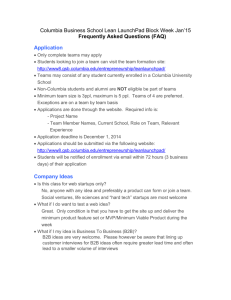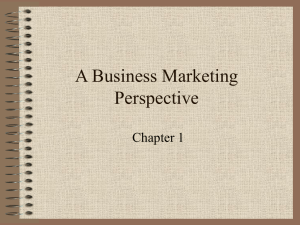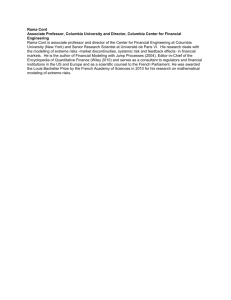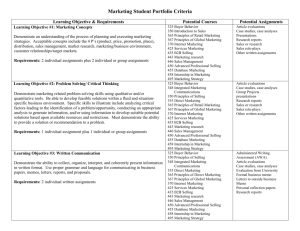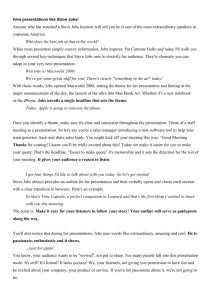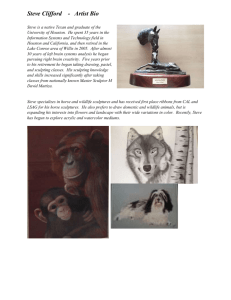Business Marketing & Innovation Start
advertisement
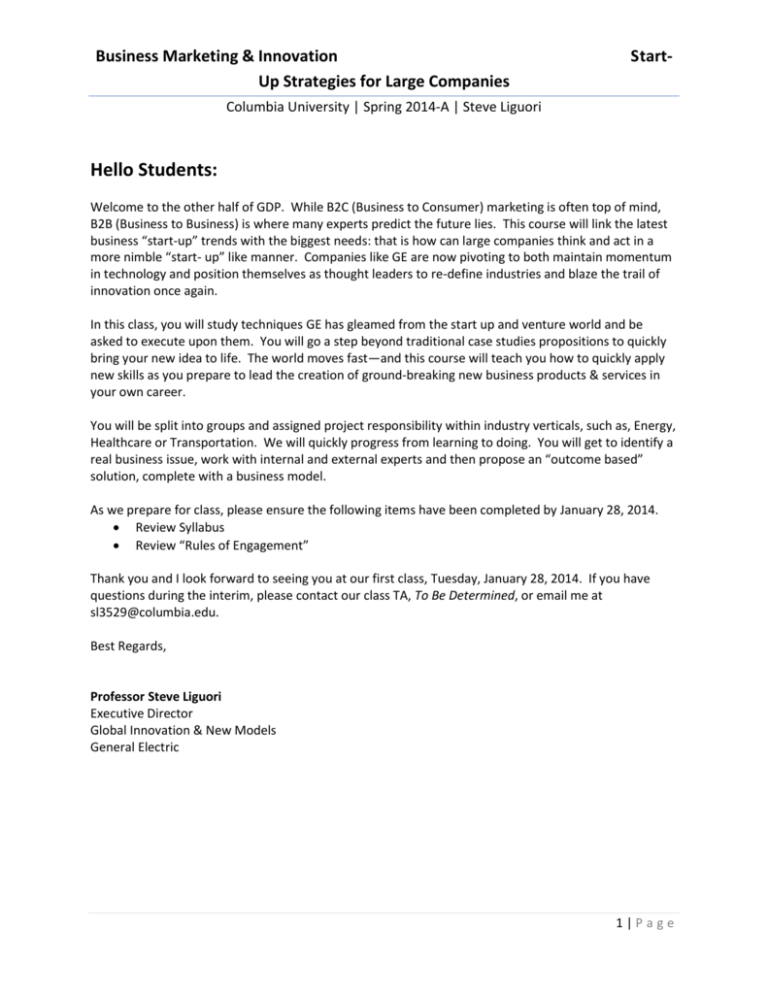
Business Marketing & Innovation Up Strategies for Large Companies Start- Columbia University | Spring 2014-A | Steve Liguori Hello Students: Welcome to the other half of GDP. While B2C (Business to Consumer) marketing is often top of mind, B2B (Business to Business) is where many experts predict the future lies. This course will link the latest business “start-up” trends with the biggest needs: that is how can large companies think and act in a more nimble “start- up” like manner. Companies like GE are now pivoting to both maintain momentum in technology and position themselves as thought leaders to re-define industries and blaze the trail of innovation once again. In this class, you will study techniques GE has gleamed from the start up and venture world and be asked to execute upon them. You will go a step beyond traditional case studies propositions to quickly bring your new idea to life. The world moves fast—and this course will teach you how to quickly apply new skills as you prepare to lead the creation of ground-breaking new business products & services in your own career. You will be split into groups and assigned project responsibility within industry verticals, such as, Energy, Healthcare or Transportation. We will quickly progress from learning to doing. You will get to identify a real business issue, work with internal and external experts and then propose an “outcome based” solution, complete with a business model. As we prepare for class, please ensure the following items have been completed by January 28, 2014. Review Syllabus Review “Rules of Engagement” Thank you and I look forward to seeing you at our first class, Tuesday, January 28, 2014. If you have questions during the interim, please contact our class TA, To Be Determined, or email me at sl3529@columbia.edu. Best Regards, Professor Steve Liguori Executive Director Global Innovation & New Models General Electric 1|Page Business Marketing & Innovation Up Strategies for Large Companies Start- Columbia University | Spring 2014-A | Steve Liguori Logistics: Professor: Steve Liguori Teaching Assistant: To Be Determined Executive Director Global Innovation & New Models General Electric Contact: sl3529@columbia.edu Officer Hours: By appt; via email Contact: TBD Office Hours: By appt only Location: TBD Phone: TBD Class Details: Dates: Tuesday; January 28, 2014 to Tuesday; March 4, 2014 Time: 2:15pm-5:30pm Location: URI TBD Class Objectives: 1.) Discover the vast expanse of B2B Marketing 2.) Exposure to leading “Start-Up” techniques 3.) Apply the above to create a new product that solves a real business need in a complex organization. Grading Breakdown: Class Participation Class Assignments (4 x 10%) Group Mid-Class Presentation Group Final Presentation …… 10% …… 40% …… 10% …… 40% Attendance: A student may be absent for one class, excluding the final presentation in Week 6 Each additional act of absenteeism will result in the deduction of 1/3 letter grade Please contact your TA with course questions. Thank you. 2|Page Business Marketing & Innovation Up Strategies for Large Companies Start- Columbia University | Spring 2014-A | Steve Liguori 3|Page Business Marketing & Innovation Up Strategies for Large Companies Start- Columbia University | Spring 2014-A | Steve Liguori Class Description: The vast majority of current marketing efforts are focused on the excitement around consumer markets and technology. The world is obsessed with gadgets and apps with start-ups gleefully racing to join in. Yet, by most estimates the “B2B” or “Business to Business” portion of the economy represents over 50% of Global GDP. Many don’t realize that behind the scenes large, complex industrial & technology companies are investing billions to upgrade products, services & technologies. This promises to be a huge economic growth engine. The need for agility, speed and innovation has never been more urgent and companies like GE are attempting to re-learn entrepreneurial start-up principles in a highly complex global, digital and connected world. Students in this course will focus on applying start-up and entrepreneurial skills to emerging areas that promise huge impact to both companies and the customers and communities they serve. Two prominent growth areas: the Industrial Internet and Advanced Manufacturing will be explored in this course. Both of these in essence involve the combination of new digital applications like big data and predictive analytics with complex networks and machines in enterprises such as transportation, hospitals & power grids. Potential benefits are enormous. In the energy grid alone, saving 1% annually on fuel consumption over 15 years is worth $60+ Billion. Additionally, gains from less fuel waste, improved healthcare and more reliable transportation benefit both businesses and the communities they serve. Teams will meet with experienced business executives and thought leaders who are in search of new digitally enabled industrial products while applying start-up & agile processes in complex organizations, such as GE. Those interested in Business, Marketing, Engineering, Finance, Sales or Manufacturing careers are welcome to apply. 4|Page Business Marketing & Innovation Up Strategies for Large Companies Start- Columbia University | Spring 2014-A | Steve Liguori Weekly Agenda and Assignments: Week Focus Weekly Content January 28, 2014 Introduction to B2B Marketing & Big Data HBR articles Industrial Internet; Advanced Manufacturing GE’s Gold Standard 2 February 4, 2014 Discovering Customer Problems Problem Definition Building Business Concepts Business Models 3 February 11, 2014 Generating Hypotheses Leap of Faith Assumptions Rapid Prototyping 4 February 18, 2014 Experimenting Ten Types of Innovation Start Up Best Practices 1 5 February 25, 2014 9 Step Go-to-Market Process Business model pilot complexities Scaling new business models 6 March 4, 2014 Funding & Start-Up Proposal Group Presentations to mock VC Board 5|Page Business Marketing & Innovation Up Strategies for Large Companies Start- Columbia University | Spring 2014-A | Steve Liguori Write ups and Assignments: All Write ups and Assignments will be due Monday night at midnight before the next day’s class. Group Presentations during Weeks 3, 4 & 5 In addition to a paper each week, each group will do one 8 minute presentation (with 5 min Q&A) regarding the group’s progress on the previous week’s topic, starting with Week 3. These presentations are not expected to be completely polished—they are meant to be a vehicle to facilitate broader, working discussions. Topics to address could be: issues and challenges in arriving at the week’s checkpoint, what’s working, ideas and questions—even from the presenting group. Eight groups will be assigned, with2-3 groups presenting each week (schedule to be listed). Presentations should include PPT, addressing topics within the written portion of the assignment. Week 1 | January 28th Introduction to B2B Marketing & How “Digital Meeting Physical” Changes Everything Topics: B2B Marketing and intro to the Industrial Internet & Advanced Manufacturing GE’s Gold Standard Marketing Defining problem statements Our first class will be an introduction to the world of B2B marketing and innovation, as well as an overview of GE’s approach and benchmarks for Gold Standard Marketing. The opportunities for solving large complex problems will be explored. We will also discuss problem statements, and stakeholder ecosystems. Write up: Each group will be responsible for a 1 page, single spaced paper describing an initial problem statement as well as the potential customer outcome. Please be conscientious when choosing your problem statement, as this will lay the groundwork for your future assignments and business model development. Assignments: 1. Develop, articulate a potential customer problem to solve that integrates a physical and digital solution. 2. Model stakeholders utilizing a value constellation exercise to clarify decision makers and influencers. 6|Page Business Marketing & Innovation Up Strategies for Large Companies Start- Columbia University | Spring 2014-A | Steve Liguori Week 2 | February 4, 2014 Building Business Concepts Topics: Writing B2B concepts Constructing business model concepts Today’s class will revolve around utilizing your problem statements as a foundation to develop a business concept. Using a template, we will deconstruct the foundational elements of a business model concept in a B2B environment. The “Business Model Canvas” will also be introduced, which will be employed as a catalyst to promote innovate thinking in the development of fresh or “outside the box” product ideas. Write up: Each group will be responsible for a 1 page, single spaced paper describing the business model hypothesis based on your problem statement. Exercise: Develop a business model concept and provide a completed template in addition to the write up. Additional Introductory Call: After the first class, at least one person from each team (preferably all) will attend a conference call with a GE representative. Calls will be organized by industry vertical, in which the rep will introduce the industry and product. Failure for at least 1 person from the team to attend this call will result in a one letter grade deduction from the final presentation. Week 3 | February 11, 2014 The Value of Prototypes Topics: Lean Startup methodology Leap of faith assumptions Minimum Viable Products GE’s prototyping best practices Today’s session will delve into the true value of prototyping—and the ability to do so in a quick and agile fashion. It will investigate development risks, best practices and illustrate the benefit of validating concept elements and key hypotheses with real customers. 7|Page Business Marketing & Innovation Up Strategies for Large Companies Start- Columbia University | Spring 2014-A | Steve Liguori Write up: Each group will be responsible for a 1 page, single spaced paper describing the leap of faith assumptions and Minimum Viable Products. Assignments: Develop a Minimum Viable Product schedule with logic support based upon leap of faith assumptions. Week 4 | February 18, 2014 Importance of Business Models Topics: Ten Types of Innovation Deep dive Rapid protoyping Harnessing the momentum from last week, we will explore ways to apply “Ten Types of Innovation” to develop multifaceted business models. We will then usher these robust business models into the next stage in the Innovation process: transforming your business model into a viable pilots. Write up: Each group will be responsible for a 1 page, single spaced paper describing the business model concepts developed using the Ten Types of Innovation. Assignments: Develop Ten Types concept model using deck of cards. Write 3 concepts using a minimum of 3 Types per concept (preferably, one model should have at least 1 concept with 5 types). Week 5 | February 25, 2014 Pilots & Commercialization Topics: Business model pilot complexities Scaling new business model This week we will explore the challenges, risks and complexities of developing and executing successful commercial pilots. Once a pilot has been proven, we will examine the road to scaling a new business model and the spectrum of success juxtaposed to traditional B2B launches. Assignments: Prepare final group presentation for next week. Week 6 | March 4, 2014 Final Presentations 8|Page Business Marketing & Innovation Up Strategies for Large Companies Start- Columbia University | Spring 2014-A | Steve Liguori Final presentations will be viewed by Professor Liguori and a panel of judges. The panel will function as a mock VC Board. Each group will present (with PPT) for 15 minutes with an additional 5 minutes of Q&A. This should be a business model pitch plus start-up funds requested—much like you would pitch to an investor panel. Presentations should include topics such as: the customer need, the problem being solved, the approach taken and why with revenue and market projections going forward. Your goal is to get “funded” by the panel. Guidelines for Interactions: One of the key benefits of this course will be your opportunity to go “behind the scenes” with established B2B companies. You will be engaging with current industry executives from GE, thought leaders and GE customers to ascertain primary research, understand stakeholder needs and pressure test the prototypes of your proposals. This will require you to attentively follow the below Guidelines, to be cognizant of professionalism, “real time” business relationships and sensitive information. Please adhere to the requirements are listed below: Select ONE point of contact on your team to communicate with GE Employees and Customers. Copy your point of contact on all emails between your team and Customers. You will be expected to meet with your GE Employee contact and Customer at their location throughout the course of the term, which you should… o Meet at their location/site of choosing; o Always be early; o Dress professionally; o And have an agenda, which is sent in advance, with, if possible, your questions. This is a great way to gain valuable insight, so always act professional and be courteous of your contacts’ time. 9|Page

